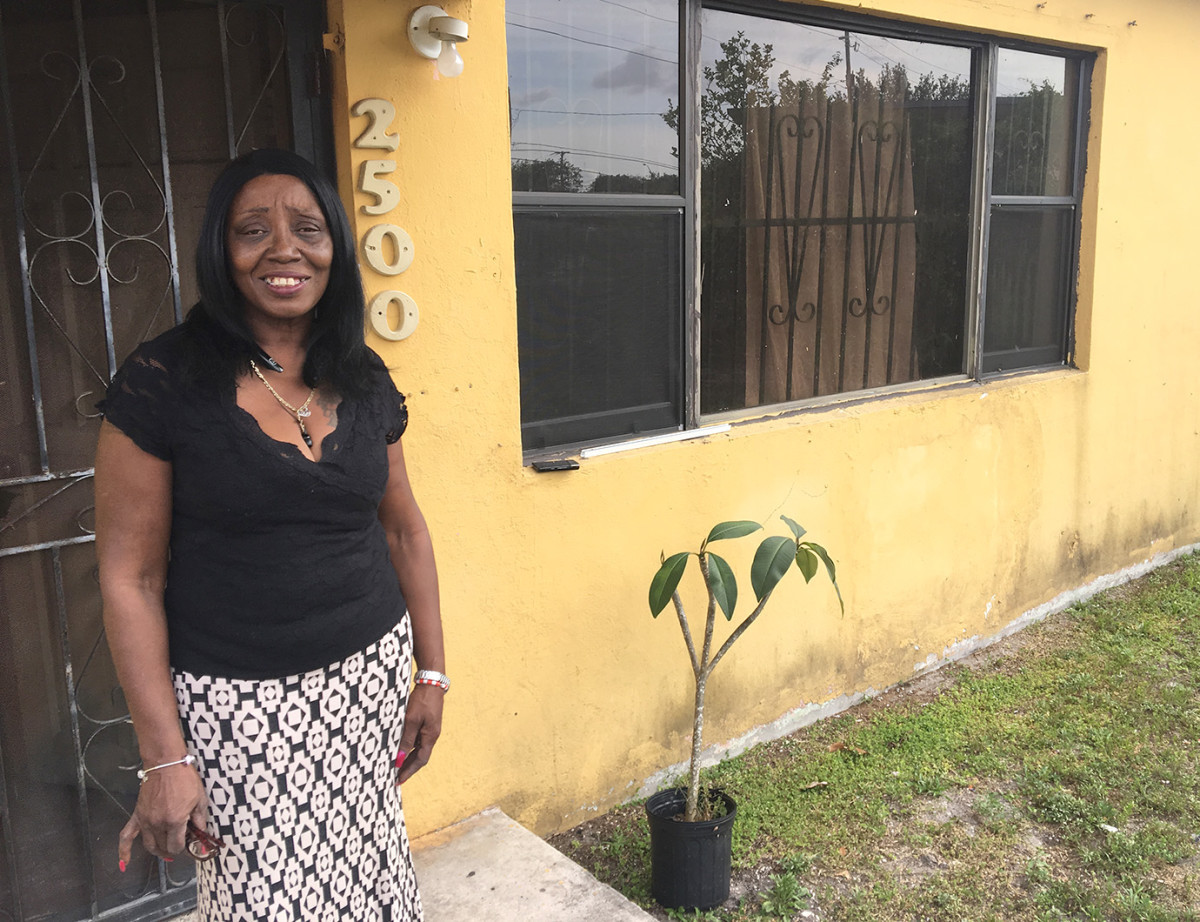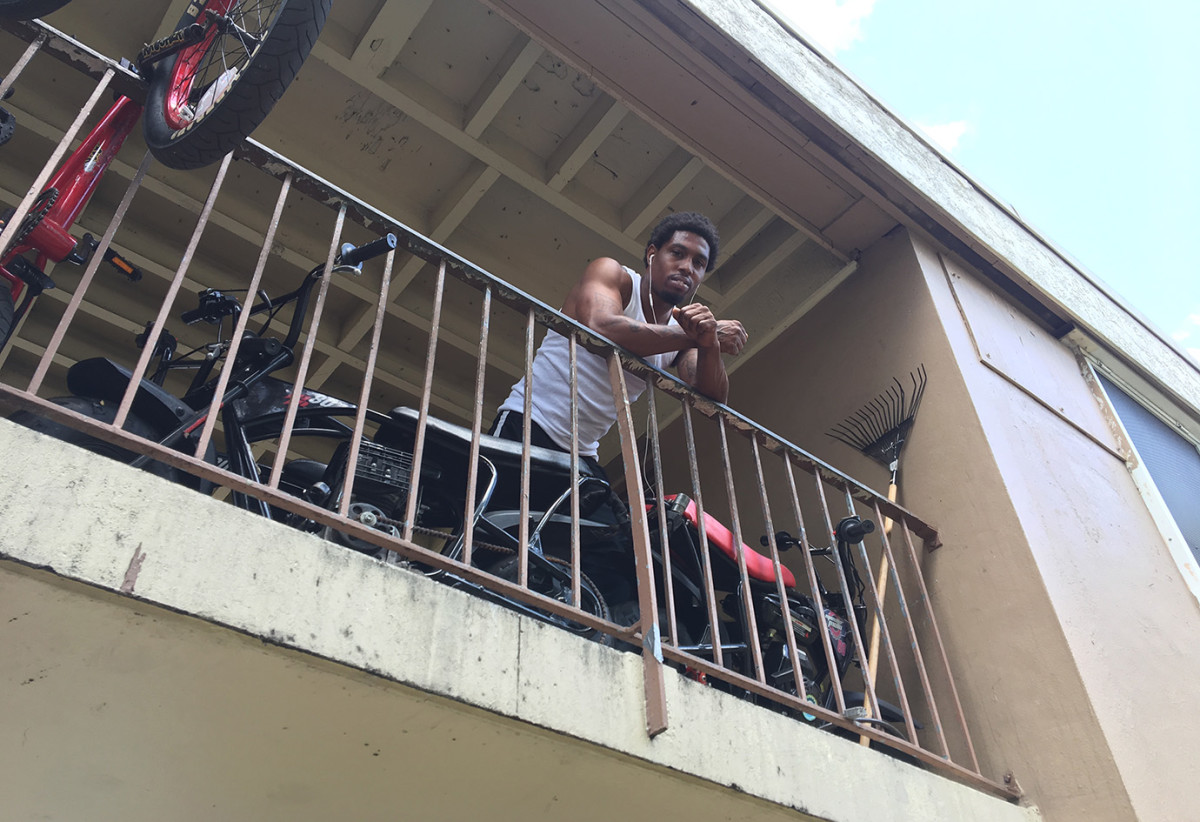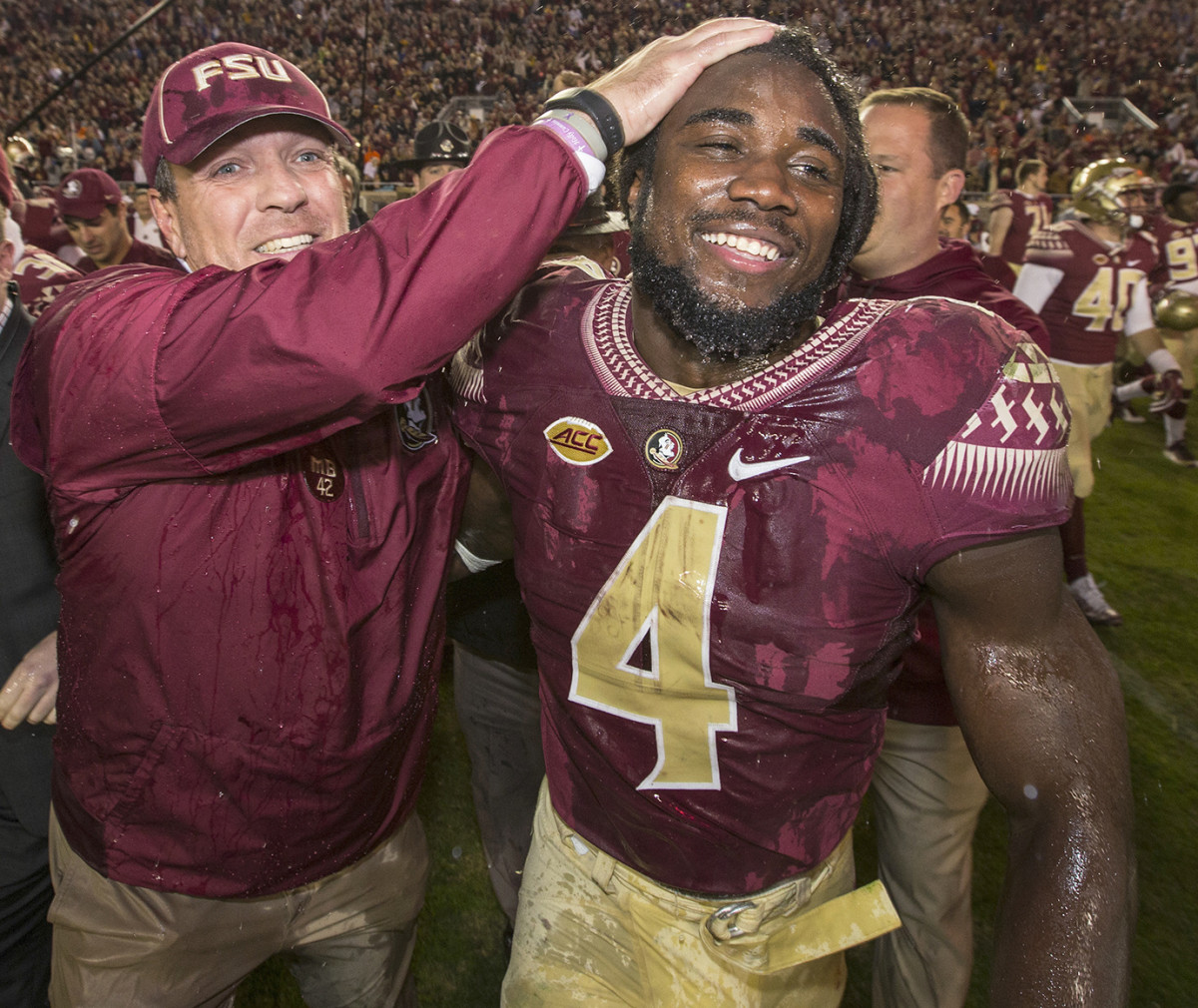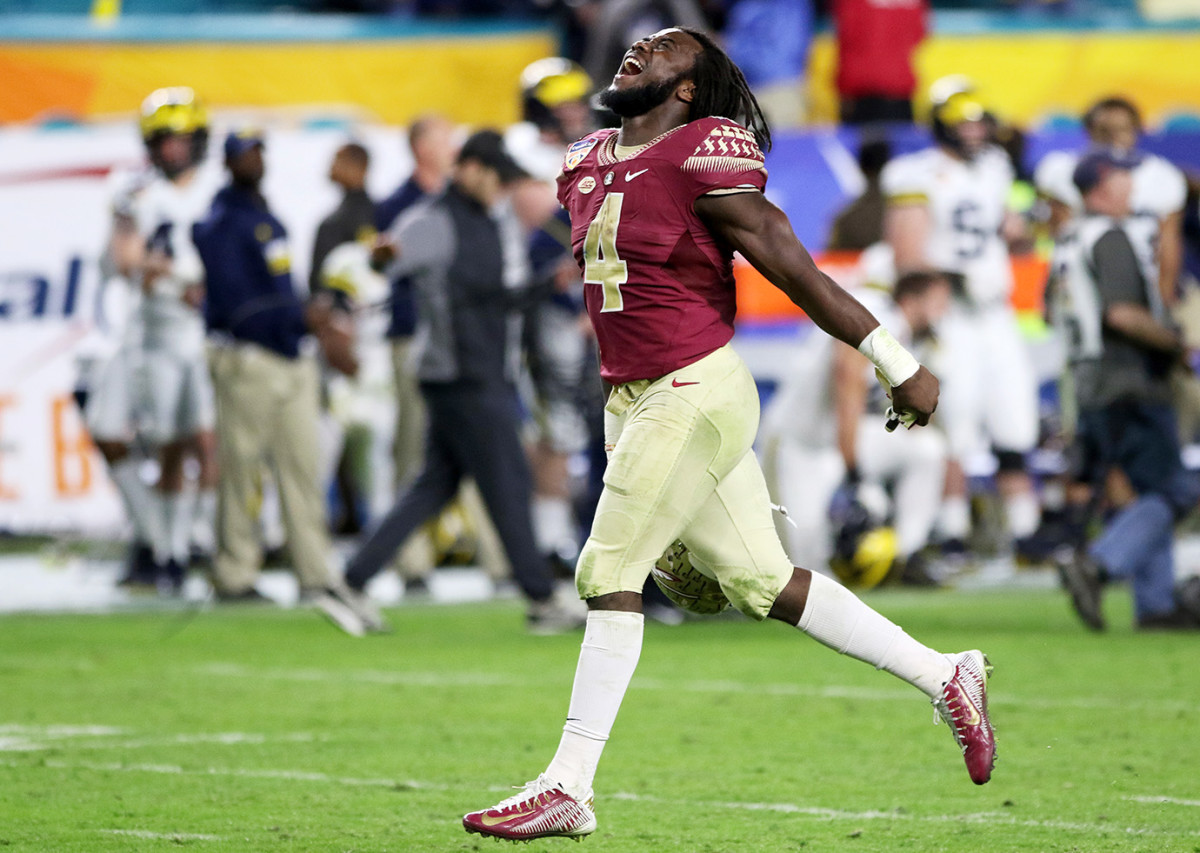Dalvin Cook and the Stories Behind the Red Flags

BOCA RATON, Fla. — Dalvin Cook sets down the PlayStation controller and takes a seat on the couch in his new apartment in Boca Raton, a temporary home before the NFL draft. Cook’s new pearly white Mercedes sits in the condominium parking lot outside. There’s a glass bowl on the coffee table, mounted upon a trophy base filled with fake oranges commemorating Cook’s final game as a collegian, when he willed one football powerhouse over another. It would’ve been nice to simply rest on the strength of 207 all-purpose yards in a 33-32 Orange Bowl victory over Michigan on New Year’s Eve, his magnum opus, but that’s not how the NFL works.
“Once you get into this whole process, you really figure out it’s a business,” Cook says with a quiet authority. “They trying to figure out the person you are, who you are, what you is, what tick you off, all that. More than anything else, it’s a business.”
Cook, the 21-year-old running back from Florida State and native of Miami-Dade, has been a challenging case for NFL scouts and executives tasked with reducing his life experience to a few pages in a scouting report. You’d need more than three months to parse through the stock characters peppering Chapter 1 of The Dalvin Cook Story. There are the fallen idols and incarcerated relatives and gun-toting companions. And, in the past few weeks, a new character has been introduced: the saboteur.
It’s one of a dozen subplots surrounding Dalvin Cook. But before sorting through the drama, you have to understand who Cook is, where he comes from and who raised him.
* * *
Unlike many expected first-rounders, Cook won’t be in Philadelphia when the next chapter of his life begins; he says he would rather be with his family and friends in Miami-Dade. It’s a fitting tribute to Betty Cook, the grandmother who fostered several children, including Dalvin, in her dim single-story home near Opa-Locka, a community as known as much for its violent crime as for its football talent.
In 2007 Cook moved permanently from his mom’s residence to his paternal grandmother’s yellow-painted house. Betty Cook, known to football coaches, players and neighbors as Miss Betty, raised her son, Anthony Jones, and Dalvin, along with any other boys who were friends with the pair and needed shelter or guidance. When the mother of Tavius Brown, Cook’s teammate at Miami Centra High, moved away, Miss Betty took him in. She did the same for another of Cook’s teammates, Da'Vante Phillips, after his mother was killed in a drive-by shooting in 2013.
“She raised us,” says Dalvin, who has Betty’s name and birthdate tattooed on his arm. “She was tough on us, and she loved football.”
Miss Betty, who works at Gordon Food Services as a meeting coordinator, regularly made peanut butter and jelly sandwiches for the entire football team to eat after practices during the summer. She donated clothes to students who needed them, and if they didn’t fit she tailored them herself.
“Sometimes all they need is a little help, a little bit of direction,” says Miss Betty, whose husband died three years ago of a rare blood disease, “and it’s not there for them.”
A who’s who of college head coaches has sat on Betty’s weathered brown sofa, next to the bible opened permanently to Psalm 23, across from the clustered stacks of youth football accolades for Jones and Cook.
“I’ve had Texas in here,” she says, her long braids draping over the long-faded tattoo below her left collarbone. “I think he’s retired… Mack Brown? Florida’s coach. Of course, Jimbo Fisher. I’ve had all the Florida State coaches in here.”
Miss Betty says Dalvin never fully explained why he left his mother’s place. And she didn’t ask. Dalvin says he wanted to take some pressure off of her while she raised his younger siblings, and he wanted to live in Central’s school district. “All I know is he was here,” Betty says. “And he has been here ever since.”

The transition wasn’t easy. Shortly after moving in with Miss Betty, Dalvin began building the rap sheet that has given NFL teams pause. He was arrested and charged with robbery in 2009 (when he was 14); chargers were dropped. And he was arrested and charged with firing and possessing a weapon on school property when he was 15; charges were either dropped or abandoned. “He was doing wild, crazy things in middle school, but he straightened up at the high school,” Betty says.
When Florida State coach Jimbo Fisher got his turn on Betty’s couch, after Cook had established himself as the top running back in South Florida for the class of 2014, he knew of Cook’s prior run-ins with the law in his early teens, but he came away impressed. He didn’t talk much, but he listened. “If you’re going to dock every kid over something like that, we wouldn’t have half the athletes we have,” Fisher says. “Mistakes make you grow.”
And Cook had seemed to clean up his act when he joined the varsity program at Miami Central, where he met a coach determined to use the lessons of past mistakes to teach personal accountability. Among the most talented players on the roster for Telly Lockette, the new coach at Central, were Cook and Joseph Yearby, prodigious running backs and best friends. The coach told them the tale of the star who ran for more yards than either of them, but who now walked the streets aimlessly and attended Central games in shame. The story of Antwain Easterling is one that Cook learned well.
“The way he ran, he just made you miss,” Cook says. “He was as good as [Frank] Gore or [Willis] McGahee. Then everything happened, and it was all gone.”
* * *
Easterling lives at his mother’s apartment on Northwest 50th street, where a stack of bicycles and motorized mini-bikes line the balcony leading to his front door. He’s muscular, imposing even in flip flops, 11 years removed from rushing for 2,831 yards as a senior when he was ranked No. 5 on ESPN’s national list of prep running backs. He played on arguably the best high school football team in the nation in 2006, and all that success was supposed to get him out of here, Emma Easterling’s living room, where tiny German cockroaches make a daily pilgrimage across a cramped kitchen.
“Football was a way out in our city, because it was hard growing up,” Easterling says. “The things that we were seeing wasn’t normal. Drug selling, gun-slinging and shootouts every night.”
Middle school boys lined the fences at Traz Powell Stadium as Easterling churned out seven yards per carry as a junior, then exploded onto the national recruiting scene as a senior during an undefeated run for Miami Northwestern High. Among the fans were Cook and Yearby. “The first thing I remember is the crowd,” Yearby says. “Everybody used to come see him play. His cuts, his moves, everything he used to do was so exciting to see.”
At a time when prep football players were loading up on arm sleeves, wristbands and receivers’ gloves, Easterling had an effortless style. “He had a real simple swag,” Cook says. “His arms were just naked. And he had the quarterback facemask with a visor.”
Says Yearby: “I wanted to be exactly like him. I wanted to dress exactly how he did.”
Easterling had offers from dozens of Division I programs, including fierce competition from the “Big Three” in Florida—Miami, Florida and Florida State. “This was probably the best high school football player in Florida, in my opinion,” says Chris Demarest, then an assistant coach at Rutgers under Greg Schiano. “You turned on the game tape and it was just ridiculous to watch, the things he could do. Humble kid. Open-minded. Everybody wanted him.”

Then came the fall. On September 16, 2006, Easterling, then 18, and at least two other male students allegedly had sex with a 14-year-old freshman girl on the floor of a bathroom at the school. The student’s mother later told police she reported the incident to a guidance counselor and two teachers, who notified principal Dr. Dwight Bernard and two assistant principals. But Easterling wasn’t arrested until the mother called the police herself in early December, nearly three months after the incident and days before Easterling and the Miami Northwestern football team would play in the state championship. Free on a $7,500 bond, Easterling played in the championship game, which Northwestern won. He was charged with lewd and lascivious battery; charges were dropped after he completed a pretrial program. But the fallout from his arrest and the actions taken by the school jeopardized dozens of careers and flung Easterling’s college prospects into doubt.
“Antwain was a guy who every kid idolized,” says Lockette, who was the offensive coordinator at Miami Northwestern at the time. “He was the kind of kid you felt couldn’t miss. It affected a lot of these kids like Dalvin and Joe, to see someone on top, and all of a sudden it’s taken away just like that by doing the wrong thing.
“That thing changed a lot of peoples’ lives.”
When the dust settled at Miami Northwestern, the principal, Bernard, was charged with official misconduct (he was later acquitted), the athletic director of more than two decades was relieved of his duties, and the entire football staff was dismissed in the summer of 2007. “The week I’m getting married I got fired,” Lockette says, “and my wife is like, Who the hell am I marrying?”
* * *
Northwestern head coach Roland Smith would take a six-year hiatus from coaching, but his assistants were able to find work faster. Lockette took the head-coaching job at Central in 2009, one year before Cook and Yearby entered ninth grade. Cook didn’t join the program until his sophomore year, figuring he had no chance to supplant senior running back Devonta Freeman, now of the Atlanta Falcons, who led Central to a Class 6A state title in 2010.
“He had just moved in with his grandma and he was getting acclimated there,” Lockette says of Cook, “so there were some issues, but we felt we got him on the right path at Miami Central.”
As junior starters on the football team, Cook and Yearby were inseparable. Both would become five-star prep running backs, leading Central to two state championships. On running downs, Yearby played wildcat quarterback and Cook was his running back. They split carries nearly down the middle. “They had this unique relationship where there was no competition between the two,” says Miami Central Principal Gregory Bethune. “They may not want me to tell this, but I would see them walk each other to class. One would be talking to a young lady and the other would be waiting for him to finish and they’d go on their way.”
In one game, Bethune recalls, Yearby was churning up yardage on the ground and coaches called for Cook to spell him. “And Dalvin said, No coach, let him keep running, he’s hot right now,” Bethune says. “People on the outside tried to make it a rivalry between them, but they wouldn’t have it. They rooted for each other harder than their parents rooted for their own sons.”
”For the majority of these guys, coming from a poverty-stricken area,” says Fisher, “it’s survival of the fittest. If you make a mistake, you end up dead or hurt.”
Lockette was determined not to repeat the mistakes made at Miami Northwestern, so he used his first head-coaching opportunity to hammer home the idea of personal accountability. The Easterling story became allegory. He’d tell the boys about the time Easterling took four carries in the first quarter of a game, scored on all four carries, then benched himself and let his backups mop up. Then he’d talk about the incident in the bathroom, and how everything could be lost with one decision.
“Coach brought Easterling up a whole bunch, a lot, especially to me and Joe,” Cook says. “And we’d see Antwain on the streets, outside of stores and just think about what happened.”
When Lockette took a job with the University of South Florida as a running backs coach, the school replaced him with Roland Smith, his former boss at Northwestern. Smith doubled down on Lockette’s message, and Cook became the team’s emotional leader, rallying them after a regular season loss that put them out of contention for a national No.1 ranking. Meanwhile, Easterling started coming to Central games to see Cook and Yearby. While he dared not show his face at Northwestern, he attended a few rivalry games at Central, wearing a hoodie to keep a low profile.
Eventually he met Cook and worked out several times with him and Yearby, tutoring them on the finer points of ball-carrying. Most of the colleges recruiting Easterling back in 2006 dropped out of the race with the statutory rape charge. He attended Southern Miss but was suspended for violating team rules and never returned. He spent a year in community college but never played. In 2010 he says, he was shot in the back of both legs when notorious Brownsville neighborhood gangsters “Screw” and “Scar” Williams fired guns, including an AK-47, from a moving car into a crowd. He says he lost feeling in his left foot and now finds it difficult to run. Today he works part time in construction and coaches his nine-year-old son in football.
“My biggest regret is leaving USM,” Easterling says. “I tried sticking with it, but every time I was doing something good they’d bring up that incident. It got to me and I guess I wasn’t mentally tough. I was impatient. I was ready to play and the system wasn’t ready for me to play. I was being a city guy, trying to rush it, and it didn’t work out.”
“It’s just been tough, when the… how do I say this… when the support ain’t really there and you’re just freestyling on your own and you’re a young kid and you think you know what you’re doing. I fell. I painted the wrong picture.”
* * *
Jimbo Fisher understands something basic but essential about kids from Miami-Dade, an area he’s recruited personally for more than two decades.
“For the majority of these guys, coming from a poverty-stricken area, it’s survival of the fittest,” Fisher says. “They’re cautious with new people. I think Dalvin’s a great judge of character for one reason: If you make a mistake, where he’s from, you end up dead or hurt.

Cook, Florida’s Mr. Football in 2013, originally committed to Clemson, then flipped to Florida before changing his pledge one last time. Before he signed with Florida State in January 2014, he’d already taken the summer and night classes necessary to graduate high school early and enroll in the spring. Yearby did the same and wound up attending the University of Miami, where he rushed for more than 2,000 yards over three seasons before declaring early for the 2017 draft.
“Our whole environment, there’s an everyday temptation of somebody trying to pull you in and make you do bad things,” Yearby says. “We faced temptation mostly every day of our lives. We just happened to beat the odds.”
Fisher says Cook was “tremendously” hard-working from the beginning: “He came in and acted like he was the lowest guy on the totem pole and he ended up being one of the hardest workers we ever had on this team.” He rushed for over 1,000 yards on 170 carries as a freshman in 2014, pairing with eventual No. 1 overall pick Jameis Winston to lead FSU to an undefeated regular season and a playoff berth.
The lessons of Antwain Easterling seemed to resonate with Cook during his time at Miami Central. But during his freshman year at FSU, Cook became known to Tallahassee law enforcement on three occasions. He was charged with criminal mischief after a June BB gun incident that resulted in broken car windows. Also that summer, police cited him for mistreating puppies when, according to a citation issued by Tallahassee Animal Services, a state animal control officer observed “three puppies… tethered directly around the neck by a heavy chain. The dogs were unable to move and the smaller puppies were choking. I had to remove them for their safety.” That July, according to an ESPN report, Cook was named as an “associate” in an assault case of two men the Tallahassee police investigated for allegedly brandishing a firearm at a neighbor; the incident took place at Cook’s apartment.
Scouts running down the list of Cook’s transgressions early at Florida State heard from assistant coaches close to Cook that they felt he’d turned a corner late in his career in terms of maturity. “Coach Vic at FSU would tell us that Dalvin finally grew up this year and was trying to get Miami thugs out of his life and stopped going home,” said one southeast area scout for an NFL team. “They would come to Tallahassee and Dalvin would text Coach Vic when they were at his house and [Vic would] tell them to leave and be the enforcer.”
Cook denied having that sort of arrangement with Vic: “I was always a guy that stayed on top of what I had to stay on top of. Coach Fisher let me lead the team cause I was always that guy [who was] responsible.”
The summer before his sophomore year, Cook was accused of punching a woman outside of a Tallahassee bar after a confrontation and was charged with assault, to which he pled not guilty. While suspended and awaiting trial, Cook waited each day for the football team to finish summer workouts on the practice field, then got the script and matched their workouts by himself. A jury found Cook not guilty in August, and he was able to return to the football team, bursting into the national spotlight with 1,691 rushing yards in 2015.
“You learn that ball can be taken away from you quick,” Cook says. “I’ve been playing football since I was four years old. I love the game. Love everything it brings. So, you know, always think before you put yourself in those situations.”
* * *
There’s the sabotage that Cook has done to himself. There’s the sabotage that is a result of the environment he grew up in. And then there’s the sabotage that has come from others.
Tony Villani is not the saboteur. He runs XPE Sports in Boca Raton, one of a handful of preferred South Florida training spots for NFL players and ex-collegians preparing for the combine. Cook arrived in January, committed to perfecting his burst from a three-point stance, something he never had occasion to improve over three years and 5,399 yards from scrimmage as a Seminole, breaking Warrick Dunn's career rushing record in the process. Cook showed up on time, he listened, and he learned, Villani says.
“I see a kid from inner-city Miami-Dade tearing up the field, and you’re expecting this cocky kid to walk in,” Villani says, “but he’s almost too humble and quiet. I’m sitting here trying to show Dalvin Cook how to put his foot in the ground and cut and do all these things, and he’s all about it.
“I loved him. When the top guy works as hard as he does, he makes your whole group better.”
To Villani’s surprise, after the Senior Bowl he started getting calls from scouts and coaches suggesting the opposite. He was told that an agent had started a rumor at the all-star game: Cook was showing up to workouts late—if he came at all—that he’d arrived with alcohol on his breath on occasion, and with unsavory characters from the neighborhood in tow.
“I told these guys, You know me, you know I’m not going to lie to you… you’ve got it wrong,” Villani says. “It got to the point where I felt I had to go to Dalvin’s agent and tell him about what people were saying.”
The MMQB spoke with representatives from nine NFL teams on the topic of Cook, and two scouts independently cited the same man as the source of several unverified Cook rumors. This man isn’t a certified agent, but a “runner,” a sort of industry free agent who helps certified agents recruit players during the draft process.
Villani says he swore off engaging in any business dealings with this runner years ago when he stiffed XPE on a client’s bill. A scout familiar with the runner suggested he might have had an informal business relationship with Cook before the prospect settled on different representation, though when told the runner’s name, Cook said he’d never heard of him.
Says Villani: “Unfortunately, with so many people out to make a buck off these kids before the draft, it’s the wild, wild west.”
* * *
Cook says he doesn’t pay attention to the various quotes from anonymous NFL sources expressing concern, but the one quote that irked the running back’s camp, if not Cook himself, came from an evaluator in a piece by Bleacher Report’s Matt Miller. “The pattern of bad decisions [is] alarming, really,” a scout told Miller. “With my job on the line, I trust [Joe] Mixon a lot more than Dalvin Cook.”
Mixon was seen on videotape slugging an Oklahoma coed in a Norman restaurant, breaking four bones in her face. (Last week it was announced that a settlement had been reached on the civil suit brought by the victim.) Mixon is considered as talented a runner as any in this draft, though he’s projected to fall to the second or third round as a result of the incident. “People are gonna write what they’re gonna write,” says Betty Cook. “But they don’t know Dalvin Cook. That is not Dalvin Cook that they’re writing about. In a way it bothers me, and in a way it don’t, because I know it’s just talk.”
Taken individually, all of the incidents surrounding Cook can be explained away by allies painting him as a victim of circumstances. But several teams have judged Cook as a chronic off-field concern, and a player who isn’t worth the headache. Of the nine teams polled by The MMQB, three said they had no interest in Cook because of his off-field track record. Said one NFC general manager, “he’s not off our board, but there are many concerns.”
Cook says he didn’t prepare for combine interviews with a paid tutor, like many of his fellow prospects now do. One team was dissatisfied enough with Cook’s interview that they eliminated him from consideration for their first-round pick.
“I just felt like I went in there and I was honest as could be,” Cook says. “Just be yourself. That’s just going to take care of itself. I love ball. I know ball. So, you know, that part is well taken care of.”
Fisher says he would be genuinely surprised if Cook didn’t succeed in the NFL. He cited Cook’s maturity, and a unique understanding of and love for the game. He was also irked by the scout’s quote. “That’s why the guy’s a scout and not a coach,” Fisher says. “When you coach a guy you know a guy. He loves ball and he’s a good person.”

Where Cook goes in the draft is anyone’s guess. Miss Betty believes the Eagles are very interested—they were the only team to reach out to her personally. Eagles running backs coach Duce Staley called her to talk about Dalvin’s character. “He was just telling me how much he wants Dalvin,” the proud grandmother beams. “He said ‘But I don’t think he’ll be there with the 14th pick, Miss Betty.’”
Dalvin isn’t worried about where he lands. He’s concerned with the next chapter, making it out of Dade and earning life-changing money. He wants the kind of success that makes anonymous scouts glad they stayed anonymous.
“Everybody got their own opinion,” Cook says. “It ain’t nothing to me but entertainment. I just work hard, wake up everyday with the same mindset. At the end of the day, when you successful, everybody’s opinion gonna change.”
Question or comment? Email us at talkback@themmqb.com.
